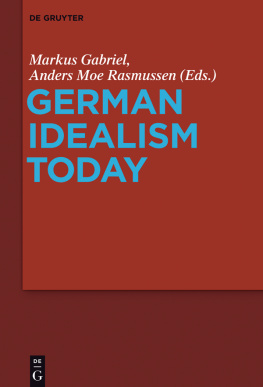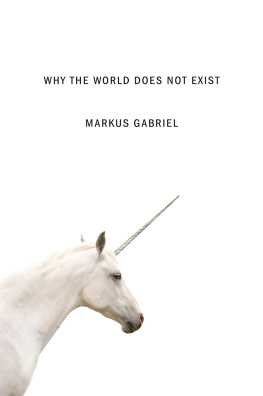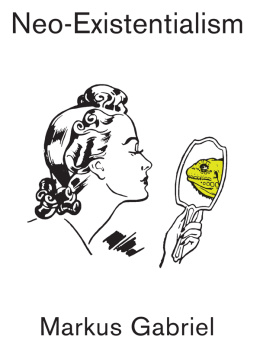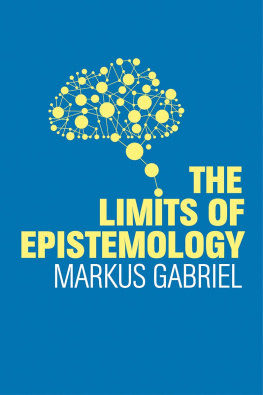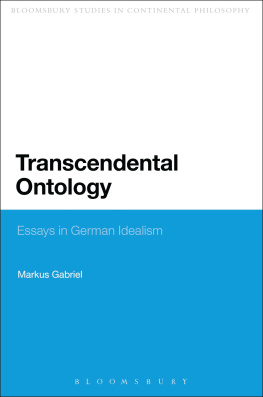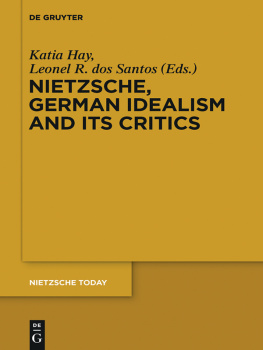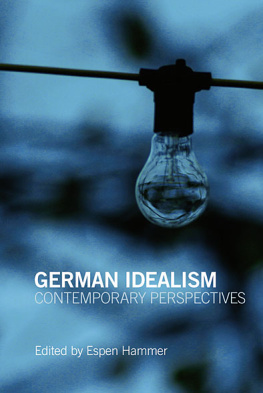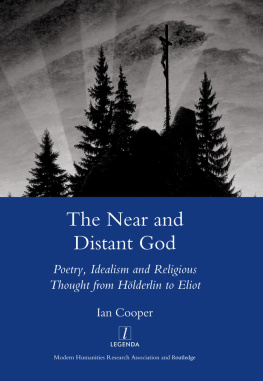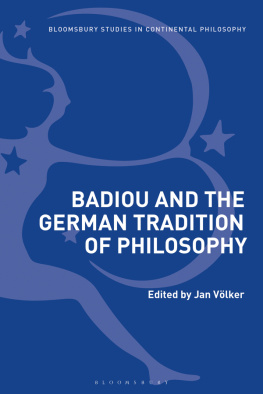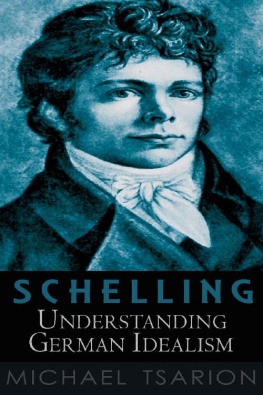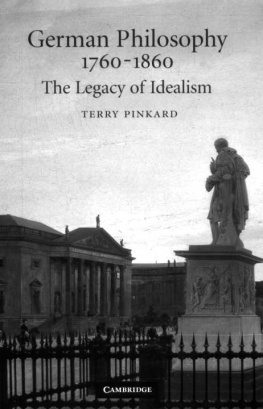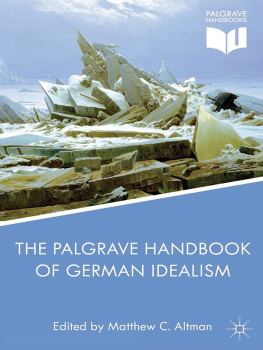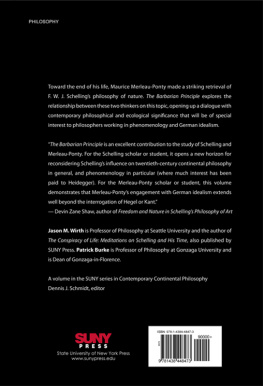Markus Gabriel - German Idealism Today
Here you can read online Markus Gabriel - German Idealism Today full text of the book (entire story) in english for free. Download pdf and epub, get meaning, cover and reviews about this ebook. year: 2017, publisher: De Gruyter, genre: Science. Description of the work, (preface) as well as reviews are available. Best literature library LitArk.com created for fans of good reading and offers a wide selection of genres:
Romance novel
Science fiction
Adventure
Detective
Science
History
Home and family
Prose
Art
Politics
Computer
Non-fiction
Religion
Business
Children
Humor
Choose a favorite category and find really read worthwhile books. Enjoy immersion in the world of imagination, feel the emotions of the characters or learn something new for yourself, make an fascinating discovery.
- Book:German Idealism Today
- Author:
- Publisher:De Gruyter
- Genre:
- Year:2017
- Rating:4 / 5
- Favourites:Add to favourites
- Your mark:
- 80
- 1
- 2
- 3
- 4
- 5
German Idealism Today: summary, description and annotation
We offer to read an annotation, description, summary or preface (depends on what the author of the book "German Idealism Today" wrote himself). If you haven't found the necessary information about the book — write in the comments, we will try to find it.
German Idealism Today — read online for free the complete book (whole text) full work
Below is the text of the book, divided by pages. System saving the place of the last page read, allows you to conveniently read the book "German Idealism Today" online for free, without having to search again every time where you left off. Put a bookmark, and you can go to the page where you finished reading at any time.
Font size:
Interval:
Bookmark:

German Idealism Today
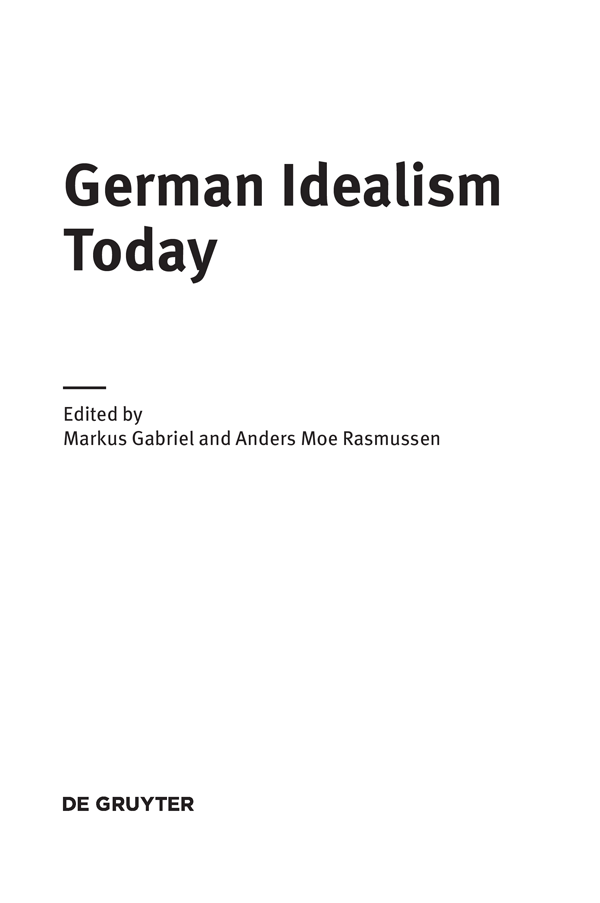
ISBN 978-3-11-050028-8
e-ISBN (PDF) 978-3-11-049861-5
e-ISBN (EPUB) 978-3-11-049751-9
Library of Congress Cataloging-in-Publication Data
A CIP catalog record for this book has been applied for at the Library of Congress.
Bibliographic information published by the Deutsche Nationalbibliothek
The Deutsche Nationalbibliothek lists this publication in the Deutsche Nationalbibliografie; detailed bibliographic data are available on the Internet at http://dnb.dnb.de.
2017 Walter de Gruyter GmbH, Berlin/Boston
www.degruyter.com
Topics from so-called German Idealism continue to play a central role in contemporary philosophy. Somewhat surprisingly, one of the reasons for the recent trend to read the proposals by philosophers from that tradition as potentially serious contributions to contemporary debates is the ambitious scope of their projects. It is fair to say that the fundamental ambition of German Idealism (including Kant) is an overall theory of human rationality and its place in nature. How is it possible to make sense of our first-person, engaged point of view in light of the anonymizing pressure modern philosophy ascribes to the ever-increasing influence of natural-scientific discoveries on our self-image as animalia rationalia? German Idealism is a response to the naturalistic challenge that takes naturalism very seriously. All thinkers of that tradition offer different diagnoses of naturalism and different strategies of restricting its potentially damaging effect on the human being, for they all agree that the human being constitutively acts in light of a conception of what the human being is. Depending on the conception of ourselves and our place in nature, the space of possible actions accordingly varies, which is why it is important in their view to figure out which elements in our conceptual repertoire are actually grounded in anonymous, purely natural forces, and which are not.
In light of Kants major contributions to the project of giving an adequate account of the relation of finite human thought to nature which provide him with a picture of the position of human agency with respect to the natural (sensible) world, it became clear to his successors that only a complete reconstruction of the logical space of concepts designed to make sense of ourselves is capable of addressing the issue head-on. Where in their eyes Kant ultimately failed to give a complete account of ourselves as minded natural agents due to his particular brand of theoretical agnosticism concerning things in themselves, they adjust their metaphysics so as to respect the overall requirement that nature must not be thought of as alien to human thought. However, for them the reason why nature is intelligible should not be located in our modes of gaining access to nature in itself, as if it lied on the other side of a dividing line between the realm of concepts and a purely causal domain of material-energetic structure formation. Nature can neither be conceived of as a transcendent other to reason nor as produced by reason in a pre-critical sense of a first-order event in reality. Reason is not immanent to reality in the same way in which natural forces are thought of as operating so as to give rise to new structures.
The metaphysical ambitions of German Idealism can play a role in contemporary philosophy again in virtue of the overall return of metaphysics and ontol It is not sufficient to refrain from metaphysical thinking in order to combat naturalism.
In part, this also explains the ontological turn discussed under the headings of speculative and New Realism in contemporary philosophy. Metaphysics, ontology, and epistemology easily become the bulwark against the overextension of methods and results from the natural sciences into the domain of human agency. Without ambition in theoretical philosophy, it is hard to work out the right place for human agency in the larger framework that matters for its reality. This is why Kant and his Post-Kantian successors did not simply dismiss metaphysics, but rather wanted to put it on firmer grounds so as to accommodate the reality of human thought and agency in the broadest domain conceivable from the human standpoint.
The contributions to this volume all deal with the exciting interface of theoretical and practical philosophy in the tradition of German Idealism. In this context, some contributions focus on the metaphysical and logical underpinning of the large-scale pictures of human agency and mindedness we inherited from the tradition under discussion here. For it is clearly impossible to isolate the prominent practical strands in German Idealism from their specific metaphysical backgrounds. All German Idealists agree with Kant that we need a revisionary meta-metaphysics and accordingly a new conception of metaphysics itself if we want to live up to the complexity of the problem of finding the right place for our form of life and thought about what there is. We cannot sidestep the issue of metaphysics and epistemology driving the debates in the Kantian and Post-Kantian era in order to content ourselves with bits and pieces from the social or political philosophies to be found in German Idealism.
The essays collected here represent the state of the art in the kind of German Idealism scholarship which seeks to make a contribution to contemporary problems on the basis of rational reconstructions of unsurpassed insights passed on to us by the mighty dead, as Brandom calls them. What matters for the voices collected in this volume is what is alive in the tradition of German Idealism and what ought to be made more fruitful with respect to current philosophical challenges.
In our view, the most pressing issue for systematic, philosophical scholarship in our time is the reconciliation of the theoretical and practical aspects of the Kantian and Post-Kantian ambition. The recent widespread return to metaphysics in both continental and analytic circles makes it clear that we cannot leave nature to science and study norms of thought or action in philosophy regardless of any conception of the physical universe. As soon as we confront the issue of how to integrate our account of ourselves as knowers and agents of a specific kind with what we know about nature, it should transpire that not all conceptions of nature are compatible with our self-description as autonomous agents. Yet, this does not mean that nature itself exerts pressure on our freedom! The point is precisely to separate the first-order question concerning the furniture of natural reality from the question of how said nature can make an appearance in the realm of truth-apt thought. The way nature is thought of is not merely an extension of nature into the realm of thought . At least, this is one of the fundamental tenets of German Idealism and a common thread running through all their major systems.
Ever since Kant, the primary reason for relying on versions of this somewhat anti-naturalistic insight derives from the point of view of the engaged intellect: as thinkers and knowers we are always engaged in practical projects, including the project of coming to know something about the furniture of natural reality. From this basic insight, all German Idealists draw the lesson that our account of nature has to be compatible with our account of ourselves as minded agents. Yet, the status of the minded agent is actually threatened by various conceptual forces. If we do not manage to work out a philosophy of nature compatible with The problem is familiar in many guises. Roughly, it says reasons for action go out at some point or other without there ever being a fundamental level of choices for which we can claim responsibility in the sense that we caused the choices to happen. The minimal structure of action and action explanation, according to which any action has an end in view without which it would not be intelligible as an action to the agent and her interpreter, suggests that the agent has to choose her end in advance of the action and its realization. However, she cannot be credited with having to choose to choose her end in advance along the same lines, as this immediately triggers a vicious infinite regress. Given this problem, it seemed to many most notably to Schopenhauer that there is an inherent limit to freedom itself: free actions are only possible on the basis of a set of choices for which no one is responsible. But this implies that there are actions, namely choices, for which no one is responsible. They merely happen to an agent. However, if the basic framework governing our actions simply happened to us, this would threaten our sense of responsibility for all other actions. This is why it is necessary to work out an account of the structure of human action that allows us to come to terms with the hard problem of free will and tell us something about how our actual freedom cannot be reduced to the carrying out of natural forces.
Font size:
Interval:
Bookmark:
Similar books «German Idealism Today»
Look at similar books to German Idealism Today. We have selected literature similar in name and meaning in the hope of providing readers with more options to find new, interesting, not yet read works.
Discussion, reviews of the book German Idealism Today and just readers' own opinions. Leave your comments, write what you think about the work, its meaning or the main characters. Specify what exactly you liked and what you didn't like, and why you think so.

